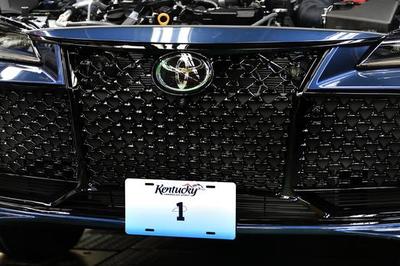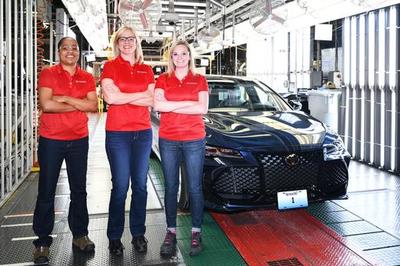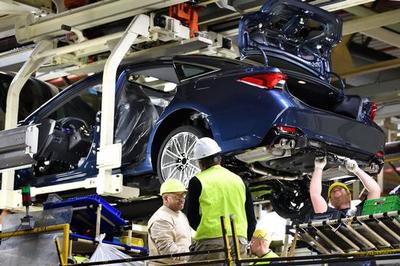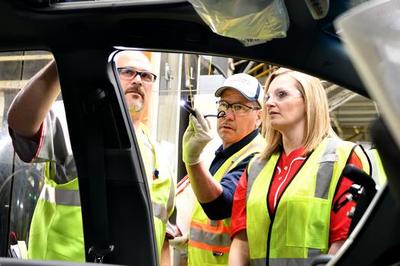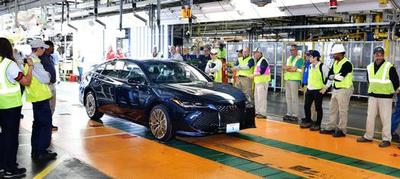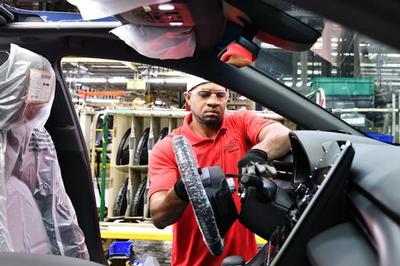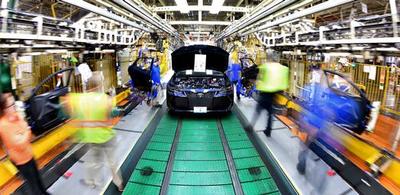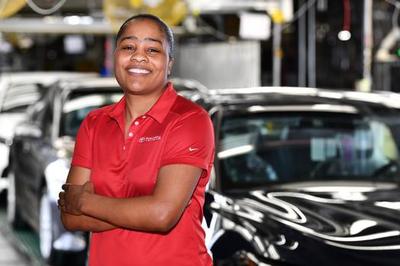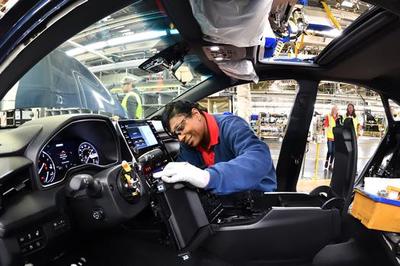2019 Toyota Avalon Production Begins, Made In Kentucky Sent Out To The World
April 23, 2018
GEORGETOWN, Ky. (April 23, 2018)—With the Kentucky Derby just two weeks away, Toyota unveiled the newest addition to a strong stable of vehicles at its plant in the Bluegrass State: the all-new 2019 Avalon.
And, a quick jump out of the starting gate is expected.
Built on its Toyota New Global Architecture (TNGA) manufacturing platform, this fifth generation of the Avalon has proven to be the “future of Toyota manufacturing,” said Susan Elkington, president of the Kentucky plant.
“TNGA allows us to be more flexible and creative on the production line – transforming the way Toyota builds cars," she added. Our recent $1.33-billion investment in this plant allowed us to be the first Toyota facility in North America to build on this platform – initially with the 2018 Camry and now with our flagship sedan, the stunning, new Avalon.”
An example of TNGA is as simple as the welding process and the “increased rigidity” it brings. The result: a quieter ride in the cabin. “It’s the difference between a coat that is buttoned and one that has a zipper,” Elkington said. “It is just that much tighter, more snug overall.”
Avalon represents Toyota’s commitment to American manufacturing: the flagship nameplate is designed and engineered in the U.S. and exclusively produced in Georgetown, Ky., by more than 8,000 team members. In fact, the Toyota Motor Manufacturing, Kentucky (TMMK) plant is the largest production facility for Toyota worldwide.
“It’s a badge of honor, working on this vehicle,” said Karen Cooper, TMMK quality engineering manager and the plant’s overall quality project lead for the new Avalon. “It’s a three-year process – our role was taking the design and ensuring it is manufacturable. We bridge between what the customer wants and how to produce that on the plant floor. The attention to detail, including the premium fit and finish of the new Avalon will make the customer proud to drive it.”
The new Avalon includes a few firsts for Toyota:
“Throughout development, we focused on the new Avalon being authentic and exhilarating,” said Randy Stephens, chief engineer. “One of the key components in getting there was the new platform and suspension. These underpinnings allow us to provide an unequaled foundation for the marriage between luxury and sportiness in the premium mid-size sedan segment.”
With four available grades, the new Avalon will accommodate a wide array of customers/drivers: the two dedicated Sport Plus models, XSE and Touring, plus the more luxurious XLE and Limited. Hybrid grades include XLE, Limited and XSE.
Elkington said a huge benefit is the diversity in the various models: “My favorite is the touring grade because it has some great driving modes. You can be in normal mode and have a smooth ride – go over a bump or pothole and barely feel it. Then you can switch to the sports mode for the driving experience. On a winding road, you feel each curve and you have the enhanced sound of the engine -- so you feel like you are driving a sports car.”
And, a quick jump out of the starting gate is expected.
Built on its Toyota New Global Architecture (TNGA) manufacturing platform, this fifth generation of the Avalon has proven to be the “future of Toyota manufacturing,” said Susan Elkington, president of the Kentucky plant.
“TNGA allows us to be more flexible and creative on the production line – transforming the way Toyota builds cars," she added. Our recent $1.33-billion investment in this plant allowed us to be the first Toyota facility in North America to build on this platform – initially with the 2018 Camry and now with our flagship sedan, the stunning, new Avalon.”
An example of TNGA is as simple as the welding process and the “increased rigidity” it brings. The result: a quieter ride in the cabin. “It’s the difference between a coat that is buttoned and one that has a zipper,” Elkington said. “It is just that much tighter, more snug overall.”
Avalon represents Toyota’s commitment to American manufacturing: the flagship nameplate is designed and engineered in the U.S. and exclusively produced in Georgetown, Ky., by more than 8,000 team members. In fact, the Toyota Motor Manufacturing, Kentucky (TMMK) plant is the largest production facility for Toyota worldwide.
“It’s a badge of honor, working on this vehicle,” said Karen Cooper, TMMK quality engineering manager and the plant’s overall quality project lead for the new Avalon. “It’s a three-year process – our role was taking the design and ensuring it is manufacturable. We bridge between what the customer wants and how to produce that on the plant floor. The attention to detail, including the premium fit and finish of the new Avalon will make the customer proud to drive it.”
The new Avalon includes a few firsts for Toyota:
- Available Adaptive Variable Suspension (AVS), which enhances controllability and sharp handling;
- Standard Apple CarPlay and Available Dynamic Auxiliary Turn Signals;
- Available Engine Sound Enhancement (that’s right, you can literally press a button that gives you the sounds of a sports car);
- Two new TNGA powertrains include a punchy 3.5-liter V6 (which allows for more power and less fuel consumption) and a 2.5-liter four-cylinder Toyota Hybrid System (the only full hybrid in the premium mid-size sedan segment).
“Throughout development, we focused on the new Avalon being authentic and exhilarating,” said Randy Stephens, chief engineer. “One of the key components in getting there was the new platform and suspension. These underpinnings allow us to provide an unequaled foundation for the marriage between luxury and sportiness in the premium mid-size sedan segment.”
With four available grades, the new Avalon will accommodate a wide array of customers/drivers: the two dedicated Sport Plus models, XSE and Touring, plus the more luxurious XLE and Limited. Hybrid grades include XLE, Limited and XSE.
Elkington said a huge benefit is the diversity in the various models: “My favorite is the touring grade because it has some great driving modes. You can be in normal mode and have a smooth ride – go over a bump or pothole and barely feel it. Then you can switch to the sports mode for the driving experience. On a winding road, you feel each curve and you have the enhanced sound of the engine -- so you feel like you are driving a sports car.”
About Toyota
Toyota has been a part of the cultural fabric in the U.S. and North America for 60 years, and is committed to advancing sustainable, next-generation mobility through our Toyota and Lexus brands. During that time, Toyota has created a tremendous value chain as our teams have contributed to world-class design, engineering, and assembly of more than 36 million cars and trucks in North America, where we operate 14 manufacturing plants (10 in the U.S.) and directly employ more than 47,000 people (more than 37,000 in the U.S.). Our 1,800 North American dealerships (nearly 1,500 in the U.S.) sold more than 2.7million cars and trucks (2.4 million in the U.S.) in 2017 – and about 87 percent of all Toyota vehicles sold over the past 15 years are still on the road today.
Toyota partners with community, civic, academic, and governmental organizations to address our society’s most pressing mobility challenges. We share company resources and extensive know-how to support non-profits to help expand their ability to assist more people move more places. For more information about Toyota, visit www.toyotanewsroom.com.
Toyota has been a part of the cultural fabric in the U.S. and North America for 60 years, and is committed to advancing sustainable, next-generation mobility through our Toyota and Lexus brands. During that time, Toyota has created a tremendous value chain as our teams have contributed to world-class design, engineering, and assembly of more than 36 million cars and trucks in North America, where we operate 14 manufacturing plants (10 in the U.S.) and directly employ more than 47,000 people (more than 37,000 in the U.S.). Our 1,800 North American dealerships (nearly 1,500 in the U.S.) sold more than 2.7million cars and trucks (2.4 million in the U.S.) in 2017 – and about 87 percent of all Toyota vehicles sold over the past 15 years are still on the road today.
Toyota partners with community, civic, academic, and governmental organizations to address our society’s most pressing mobility challenges. We share company resources and extensive know-how to support non-profits to help expand their ability to assist more people move more places. For more information about Toyota, visit www.toyotanewsroom.com.



